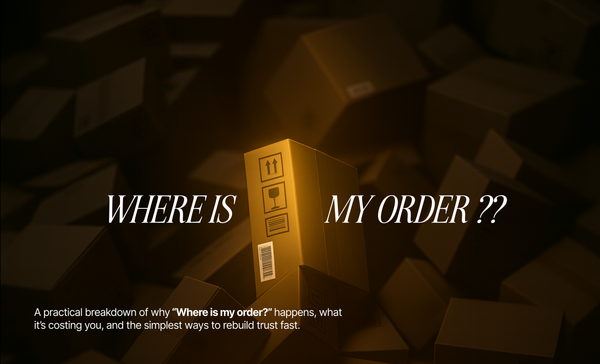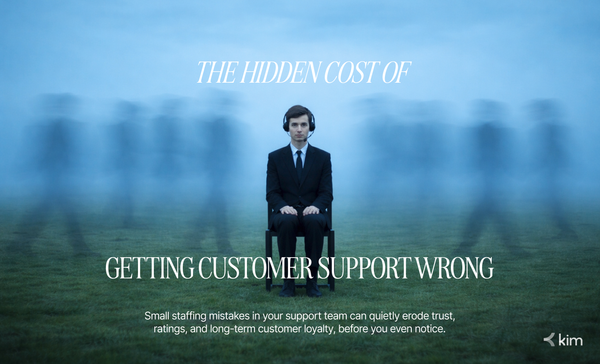Top Interview Questions to Ask When Hiring a Customer Support Representative
Customer support isn’t just about solving problems. It’s about how those problems get solved, under pressure, often with incomplete context, and in a tone that reflects your brand.
That’s why hiring for this role requires more than surface-level questions. The right rep doesn’t just know how to answer customers, they know how to handle emotion, stay calm, and think clearly when it counts.

This guide walks you through the top interview questions that reveal how someone will actually perform, and how to spot the right fit before they even join your team.
Table of Contents
- Why This Role Is More Strategic Than It Seems
- What to Watch Before the Interview Even Starts
- Top Interview Questions to Ask the Candidates
- Soft Skills That Matter More Than Experience
- Final Thoughts: You're Not Just Hiring for Today
Why This Role Is More Strategic Than It Seems
Support is often the only human interaction your customer has with your brand. And that interaction usually happens when something goes wrong.
A good rep can de-escalate. A great one can rebuild trust.
Which is why interviews need to go beyond “Can you use Zendesk?” or “What’s your typing speed?” The goal is to see how someone thinks, responds, and represents.
What to Watch Before the Interview Even Starts
Sometimes the strongest signals come before the actual questions:
- Do they communicate clearly in their emails?
- Have they explored your product or submitted a test query?
- Are they asking you thoughtful questions about workflows or tone?
These are early signs of someone who already sees support as more than just a job.
Top Customer Support Interview Questions (With What to Look For)
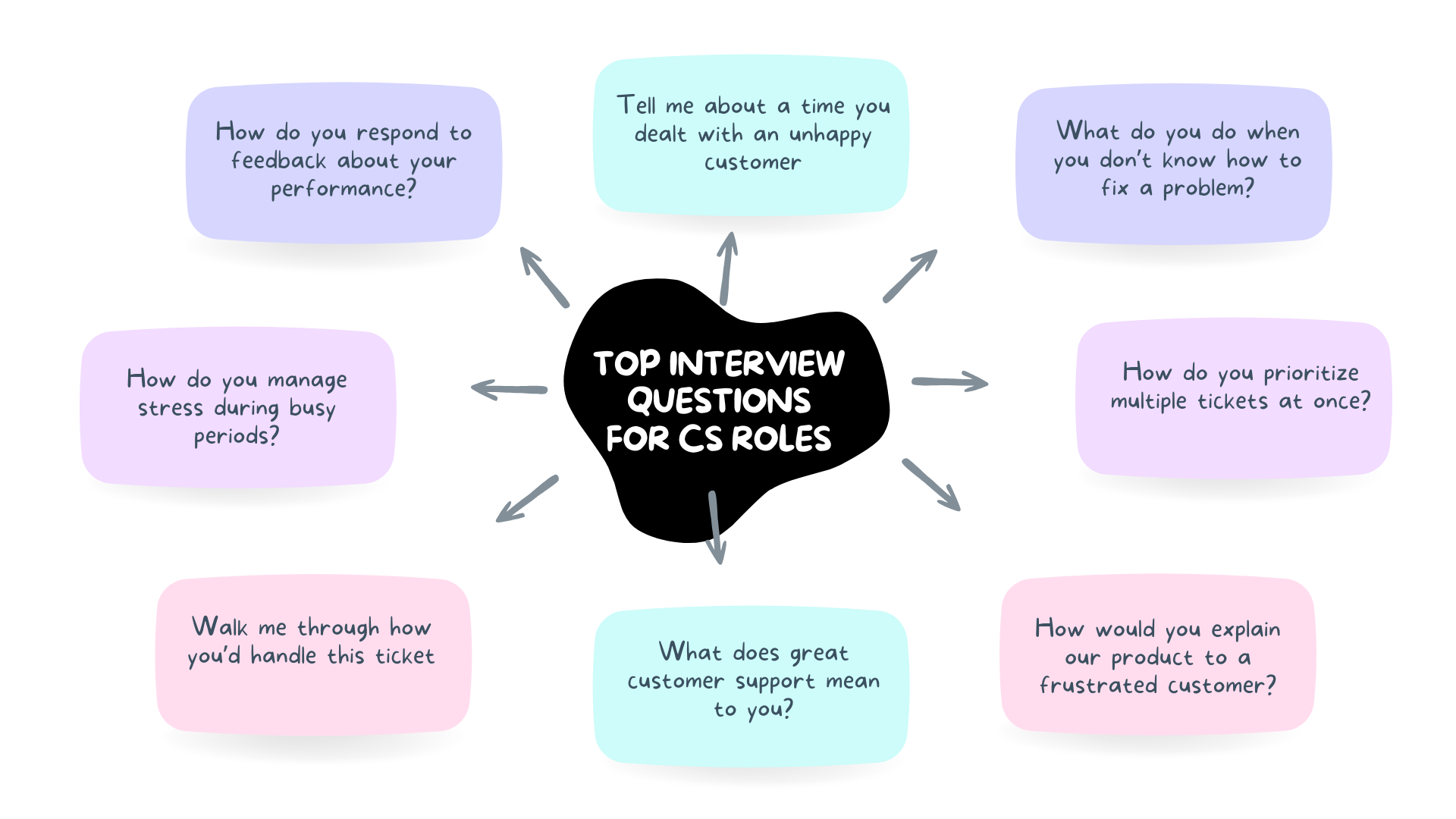
1) Tell me about a time you dealt with an unhappy customer
Reveals: Emotional control and accountability
Look for:
- Specific details about the customer and the issue
- What they did to calm the situation
- How they balanced policy with empathy
Red flag: They blame the customer or team and don’t reflect on their own role.
2) What do you do when you don’t know how to fix a problem?
Reveals: Problem-solving and communication
Look for:
- A step-by-step thought process
- Use of internal documentation or asking for help
- Proactive communication with the customer
Red flag: “I just figure it out” with no structured approach.
3) How do you prioritize multiple tickets at once?
Reveals: Decision-making under pressure
Look for:
- Awareness of urgency, SLAs, and customer impact
- Mention of using macros, tagging, or time-blocking
Thoughtfulness about communication delays
Red flag: “I go in order” or “I just try to be fast.”
4) How would you explain our product to a frustrated customer?
Reveals: Clarity, empathy, and tone adaptability
Look for:
- Simple, non-technical language
- Calm, structured tone
- Clear understanding of the product’s core value
Red flag: Jargon-heavy, long-winded, or overly defensive response
5) What does great customer support mean to you?
Reveals: Personal values and brand alignment
Look for:
- Customer-first thinking
- Long-term mindset (not just ticket resolution)
- Understanding of brand voice or tone
Red flag: Generic answers like “Just solving the issue fast.”
6) Walk me through how you’d handle this ticket
Reveals: Real-world tone, logic, and language
Look for:
- Structured steps to clarify and resolve
- Empathy in how they word their message
- Confidence without overpromising
Red flag: Robotic tone or unclear response structure.
7) How do you manage stress during busy periods?
Reveals: Emotional regulation and resilience
Look for:
- Time management strategies
- Mental resets (microbreaks, shifting perspective)
- Awareness of when to escalate or ask for help
Red flag: “I just push through it” with no coping structure.
8) How do you respond to feedback about your performance?
Reveals: Coachability and growth mindset
Look for:
- Specific examples of feedback they implemented
- Openness to metrics, reviews, and audits
- Desire to improve, not just defend
Red flag: Defensiveness or vague responses like “I usually do fine.”
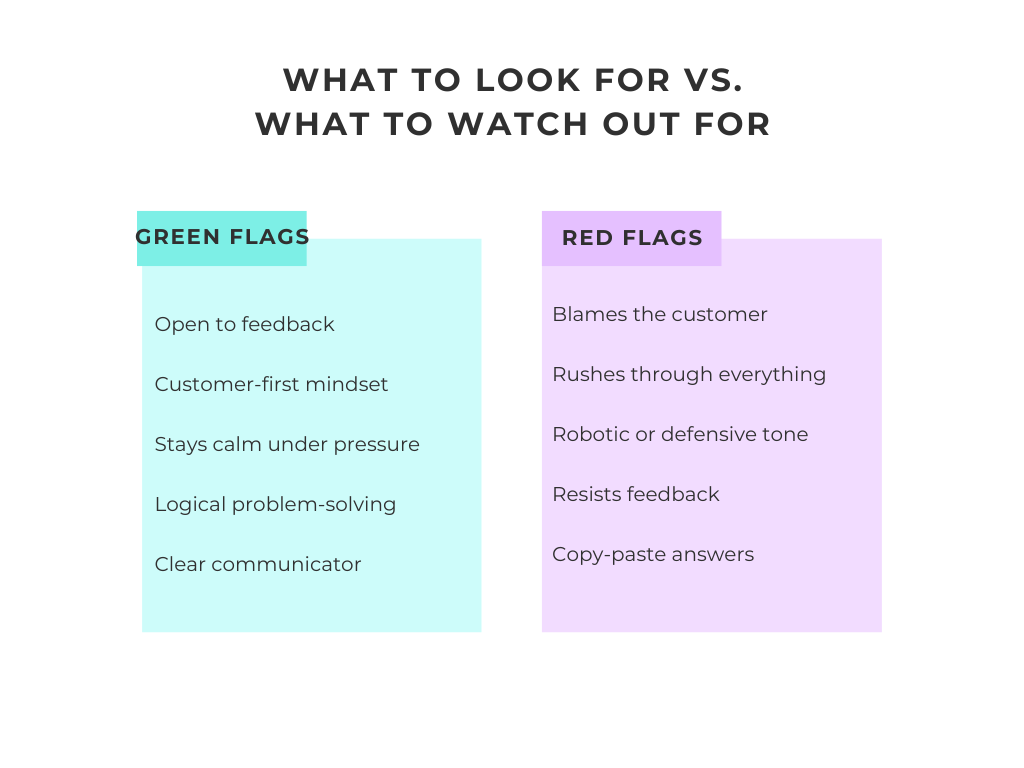
Must-Have Soft Skills for Customer Support Reps (That You Can’t Train)
Even the best tool experience won’t make up for weak instincts. These are the soft skills that turn good reps into great ones:
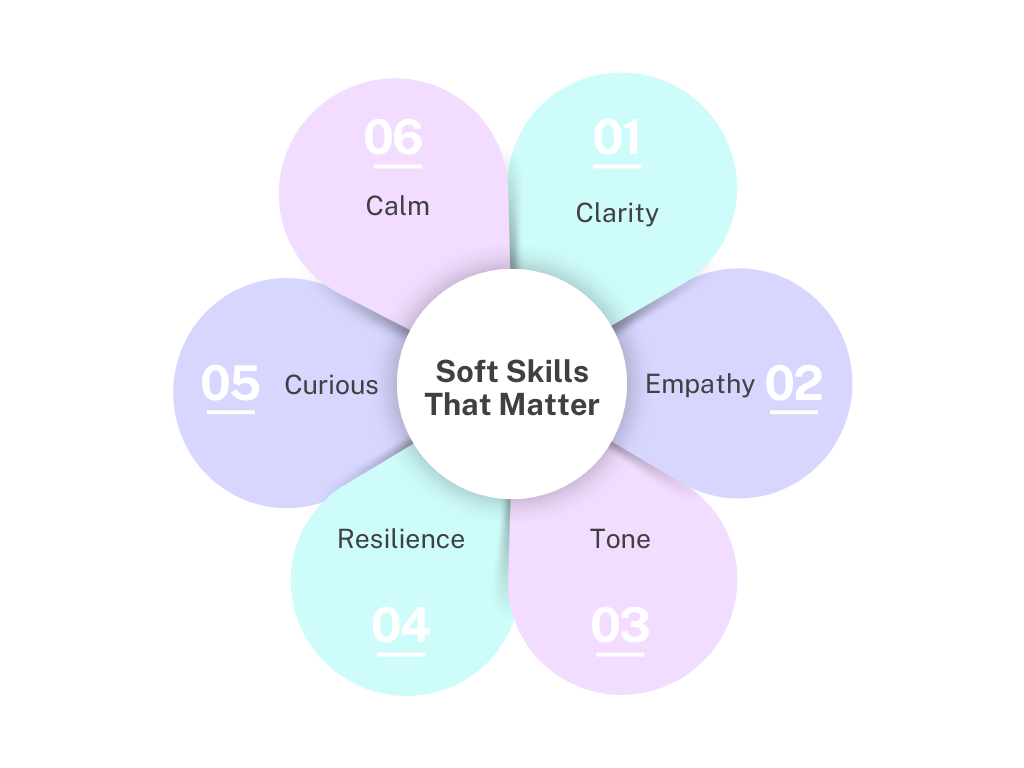
Clarity
Can they break complex info into clean, customer-friendly explanations?
Empathy
Not just “being nice”, do they really listen and respond to tone?
Calm under pressure
Can they hold the same quality of support during surges?
Structured thinking
Do they approach problems with logic and flow?
Tone matching
Can they adjust to sound like your brand?
Frequently Asked Questions About Hiring Support Reps
Here are some of the most common questions teams ask when hiring for support, and how to approach them to find the right fit.
Q1: What are the best interview questions for customer support roles?
The best questions go beyond technical skills. Ask about how candidates handle unhappy customers, navigate stressful situations, or respond to feedback. You want real examples that reveal clarity, empathy, and structured thinking.
Q2: How do you evaluate a customer service interview?
Look for specifics — not vague generalities. Great answers show ownership, calmness under pressure, and a clear process for solving problems. Use a scorecard to rate responses objectively, and keep an eye out for red flags like defensiveness or lack of logic
Q3: What soft skills should a customer support rep have?
Support reps need to do more than reply — they need to connect. That means skills like:
- Tone matching
- Empathy
- Structured thinking
- Staying calm under pressure
These are harder to train than tools, and they make the biggest impact in real customer conversations.
Q4: What should I avoid asking in support interviews?
Avoid overly generic or tool-only questions like “How fast do you type?” or “Have you used Zendesk?” These don’t reveal how someone will think or act when it matters. Focus instead on behavior-based questions that show how they manage real situations.
Final Thoughts: You're Not Just Hiring for Today
A great support rep isn’t just someone who knows the tools. It’s someone who knows how to think, how to speak, and how to stay steady when things go wrong.
Every question in this blog is designed to go deeper to help you see the person behind the resume. Because the right hire doesn’t just clear tickets.
They clear the way for trust, retention, and customer love that scales.
Want to skip the guesswork?
Kim.cc connects you with trained, ready-to-go support agents who already meet the standards in this guide.
No long-term contracts. Just the right people, when you need them.
Get started at kim.cc

